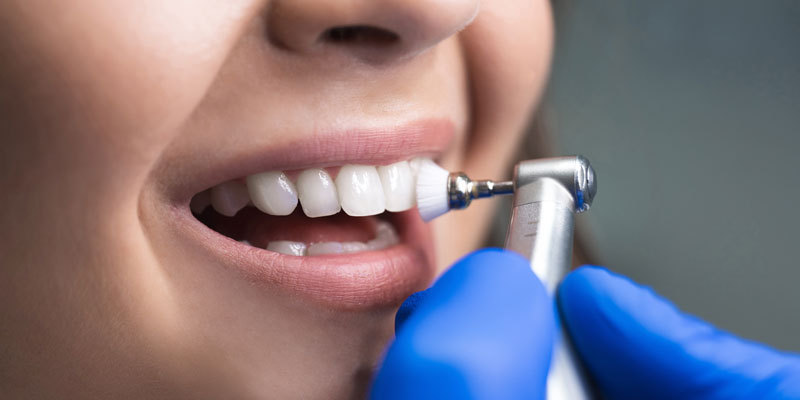- What is tooth enamel?
- What does weak enamel look like?
- What causes tooth enamel erosion?
- How can my dentist help enamel loss?
- How to prevent tooth enamel loss
Do you have sensitive teeth, or feel a twinge of pain from hot or cold food and beverages? Or do you have discoloured, translucent, or stained teeth?
These are signs of what’s known as tooth enamel erosion, a condition that can affect your dental health. The good news is that erosion is both preventable and treatable with the help of your family dentist.
What is tooth enamel?
Tooth enamel is the thin outer coating that covers and protects the crown of your tooth. Enamel is very tough – in fact, it’s the hardest tissue in the human body, even stronger than bone.
There’s a good reason why enamel has to be so rugged. It protects our teeth from the chewing, biting, crunching, grinding we do many times per day. It covers the sensitive areas within the tooth called the dentin and pulp. If the enamel is penetrated, you may experience tooth pain or sensitivity to hot and cold food and drinks. The dentin and pulp can also be exposed to bacteria, leading to cavities, tooth decay, and other unpleasant dental conditions. That’s why it’s essential to care for your tooth enamel to protect your oral health.
The enamel can become stained by smoking or drinking coffee, tea, red wine, and acidic beverages. Visiting your dentist regularly for routine cleaning and polishing will help preserve the look and functionality of your tooth enamel.
What does weak enamel look like?
There are several signs of weakened enamel, such as:
- Cracks and chips in the tooth
- Indentations on the tooth surface
- Discoloured teeth
- Increased tooth sensitivity to food and beverage tastes, textures, and temperature
- Tooth pain when exposed to cold, hot, acidic, or spicy food and drinks
If you’re experiencing any of these symptoms, you might have an oral health condition called tooth enamel erosion.
What causes tooth enamel erosion?
Enamel erosion is primarily caused by the acids in the foods and beverages you consume. These acids wear the enamel down over time, especially if you don’t properly brush your teeth after eating acidic food.
- Food that can cause tooth enamel erosion include:
- Apples and berries, which are naturally acidic
- Fruits with citric acids
- Sugar-rich food such as ice cream and caramel
- White bread and other starches
- Acidic drinks, juices, and soft drinks
Saliva is a naturally-forming agent that neutralizes acid to protect your teeth. However, excess consumption of acidic foods will hinder saliva’s ability to help maintain good oral health.
You can also experience tooth erosion if you:
- Grind your teeth (a condition known as bruxism)
- Have low saliva production or chronic dry mouth
- Suffer from acid reflux disease, also known as Gastroesophageal Reflux Disease or GERD, in which stomach acid rises into the oral cavity
- Have canker sores
- Use pain relievers, antihistamines, and certain other medications regularly
- Have been diagnosed with celiac disease, a condition in which tooth enamel erosion has been reported as a common occurrence
- Vomit frequently from chronic conditions such as alcoholism and bulimia, or acute conditions such as morning sickness related to pregnancy
- Have a condition called enamel hypoplasia, a genetic condition that causes a lack of mineralization, which is crucial in your body’s ability to make tooth enamel
Unlike many other parts of your body, tooth enamel isn’t composed of living cells. This means that once tooth enamel is compromised by physical or chemical damage, it can’t repair itself or grow back.
In other words, dental erosion is an irreversible condition. However, you can take steps to prevent it from getting worse by adjusting your eating habits and visiting your dentist for treatment.
What can my dentist do for enamel loss?
Once your teeth begin to look discoloured or translucent, you should contact your dentist for help. Delaying might worsen the symptoms and leave your teeth exposed to more extensive tooth damage.
Your dental professional will ask questions about your symptoms, nutrition, and oral health and perform a thorough examination of your teeth. Depending on their observations, your dentist will discuss the various treatment options with you to prevent further damage to the enamel.
Some of the more common dental treatments for dental erosion are:
- Bonding: Tooth bonding involves your dentist applying a composite resin to the affected teeth. Once the resin hardens, your tooth will have an added layer of protection to prevent further tooth enamel erosion. Bonding also solves cosmetic concerns from enamel erosion and is best for moderately discoloured or damaged teeth.
- Crowns: For more cases of tooth enamel erosion where the enamel is thin, weak, or chipping at the bottom, dental crowns might be the answer. Your dentist will place crowns at the top of your teeth to protect them from further wear and damage to the tooth structure.
- Veneers: Your dentist might also suggest veneers to help treat minor to moderate tooth discolouration and damage. These protective shells partially replace the tooth’s enamel.
How to prevent tooth enamel loss
Maintaining good oral habits and proper nutrition can help prevent tooth enamel erosion. Even if your enamel is starting to look translucent, you can avoid further damage by simply changing some habits.
Here are some tips to help protect your tooth enamel from erosion:
- Limit acidic beverages such as coffee, tea, carbonated drinks, and fruit juices
- Reduce eating sugary foods that can lead to tooth decay
- Avoid acidic food and drink, especially if you have acid reflux
- If you consume acidic food or beverages, rinse your mouth with water and wait one hour before brushing your teeth
- Drink more water to thicken saliva that helps remove acid from your teeth
- Boost saliva by chewing sugar-free gum between meals
- Drink beverages using a straw
- Practice proper oral hygiene maintenance, including brushing twice per day and flossing once per day
Above all, visit your dentist every six months for routine dental checkups. Your dental professional is the best partner you have for maintaining healthy enamel and a beautiful smile!
Learn more about preventing tooth enamel erosion at Yonge Eglinton Dental in Toronto.
Are you concerned about tooth enamel erosion? Come see us at Yonge Eglinton Dental! Our dental team can help you not only have a wonderful, healthy smile but also help take care of your overall well-being. Make an appointment today by calling our office at 416-932-2222 or booking online. We look forward to seeing you!
Are you concerned about visiting the dentist? Read about how we protect the health and safety of our patients and staff so your family can seek proper dental care with peace of mind.








